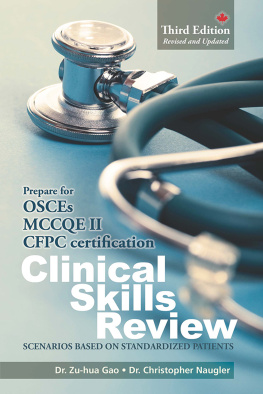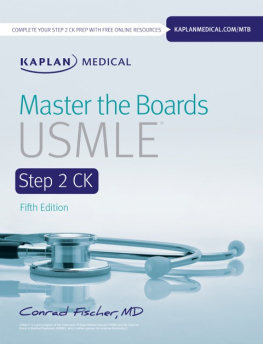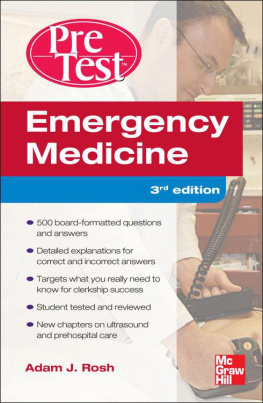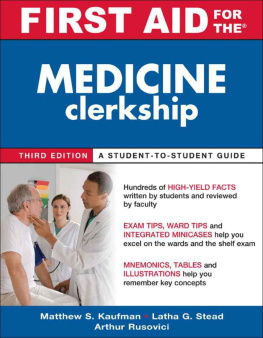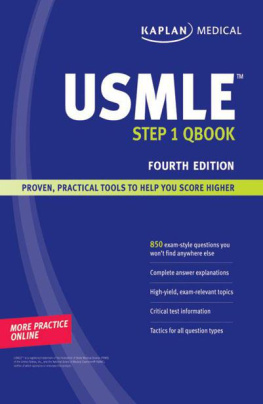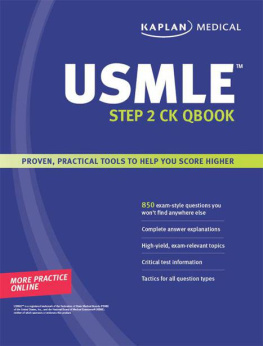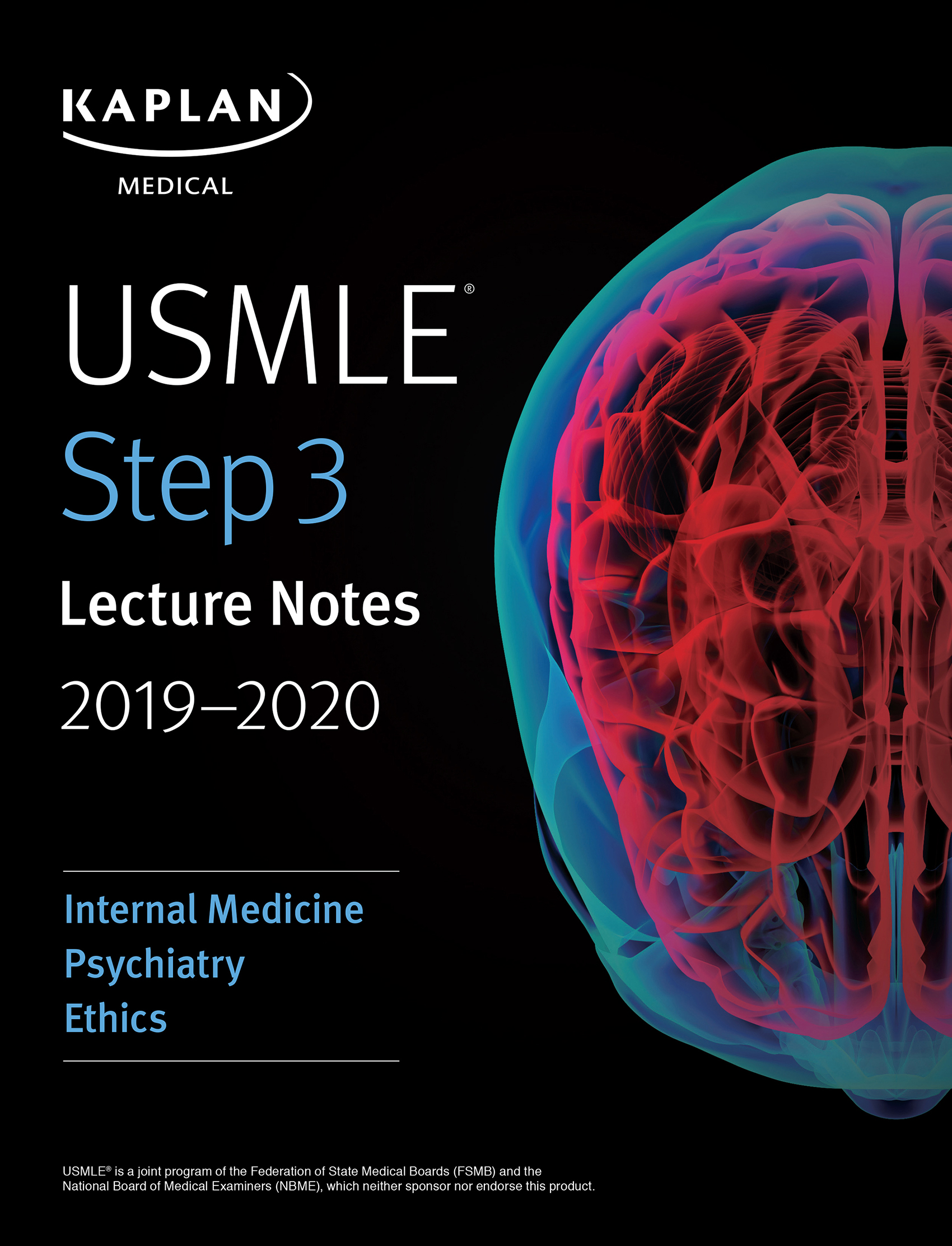
USMLE is a joint program of the Federation of State Medical Boards (FSMB) and the National Board of Medical Examiners (NBME), which neither sponsor nor endorse this product.
This publication is designed to provide accurate information in regard to the subject matter covered as of its publication date, with the understanding that knowledge and best practice constantly evolve. The publisher is not engaged in rendering medical, legal, accounting, or other professional service. If medical or legal advice or other expert assistance is required, the services of a competent professional should be sought. This publication is not intended for use in clinical practice or the delivery of medical care. To the fullest extent of the law, neither the Publisher nor the Editors assume any liability for any injury and/or damage to persons or property arising out of or related to any use of the material contained in this book.
2019 by Kaplan, Inc.
Published by Kaplan Medical, a division of Kaplan, Inc.
750 Third Avenue
New York, NY 10017
All rights reserved under International and Pan-American Copyright Conventions. By payment of the required fees, you have been granted the non-exclusive, non-transferable right to access and read the text of this eBook on screen. No part of this text may be reproduced, transmitted, downloaded, decompiled, reverse engineered, or stored in or introduced into any information storage and retrieval system, in any form or by any means, whether electronic or mechanical, now known or hereinafter invented, without the express written permission of the publisher.
10 9 8 7 6 5 4 3 2 1
ISBN: 978-1-5062-5002-1
Editors
Internal Medicine
- Joseph J. Lieber, MD
- Director of Medicine
- Elmhurst Hospital Center
- Associate Professor of Medicine
- Associate Program Director of Medicine for Elmhurst Site
- Icahn School of Medicine at Mount Sinai
- New York, NY
- Frank P. Noto, MD
- Assistant Professor of Internal Medicine
- Department of Hospital Medicine
- Associate Program Director of Education for Elmhurst Site
- Icahn School of Medicine at Mount Sinai
- New York, NY
- Internal Medicine Clerkship and Sub-Internship Site Director
- Icahn School of Medicine at Mount Sinai
- New York, NY
- Manuel A. Castro, MD, AAHIVS
- Diplomate of the American Board of Internal Medicine
- Certified by the American Academy of HIV Medicine
- Wilton Health Center (Private Practice)
- Wilton Manors, FL
- Nova Southeastern University
- Clinical Assistant Professor of Medicine
- Fort Lauderdale-Davie, FL
- LECOM College of Osteopathy
- Clinical Assistant Professor of Medicine
- Bradenton, FL
- Raj Dasgupta, MD, FACP, FCCP, FAASM
- Assistant Professor of Clinical Medicine
- Department of Medicine, Division of Pulmonary, Critical Care and Sleep Medicine
- Keck School of Medicine of USC, University of Southern California
- Los Angeles, CA
Psychiatry and Ethics
- Alina Gonzalez-Mayo, M.D.
- Psychiatrist
- Dept. of Veterans Administration
- Bay Pines, FL
We want to hear what you think. What do you like or not like about the Notes? Please email us at .
Part I
Internal Medicine
Preventive Medicine
Cancer Screening
Regular screening is recommended for cancers of the colon, breast, cervix, and lung.
Colon Cancer
Patients with no significant family history of colon cancer should begin screening at age 50. The choices are:
- Colonoscopy every 10 years (preferred screening modality)
- Fecal occult blood testing every year
- Sigmoidoscopy with barium enema every 5 years
Patients who have a single first-degree relative with colorectal cancer diagnosed age <60 or multiple first-degree relatives with colon cancer diagnosed at any age should undergo colonoscopy starting at one of the following, whichever age occurs earlier:
- Age 40
- Age that is 10 years younger than the age at which the youngest affected relative was diagnosed
In this group of high-risk patients, colonoscopy should be repeated every 5 years.
Breast Cancer
The 3 tests used to screen for breast cancer are mammogram, manual breast exam, and self-breast exam. The American Cancer Society no longer recommends monthly self-breast exam alone as a screening tool.
- Patients age 50, screen with mammogram (with or without clinical breast exam) every 12 years
- Patients with very strong family history should consider prophylactic tamoxifen
- Very strong family history is defined as multiple first-degree relatives
Cervical Cancer
The screening test of choice for the early detection of cervical cancer is the Papanicolaou smear (Pap test). In average risk women, Pap screening should be started at age 21regardless of onset of sexual activityand performed every 3 years until age 65.
- As an alternative, women age 3065 who prefer to screen every 5 years can do so by co-testing with Pap and HPV.
- In higher risk women, e.g., HIV positive, more frequent screening or screening after age 65 may be required.
Lung Cancer
Current lung cancer screening guidelines recommend the following:
- Patients age 5580 with >30 pack-years of smoking, screen annually with low dose CT (non-contrast)
- Must be current smoker or has quit <15 years
- Patients age >80, have quit >15 years, or have other medical problems (e.g., severe COPD) significantly limiting life expectancy or ability to undergo surgery, no screening is recommended
Travel Medicine
Hepatitis
Hepatitis A infection is travelers most common vaccine-preventable disease. Hepatitis A infection is possible wherever fecal contamination of food or drinking water may occur. If a patient is leaving within 2 weeks of being seen, both the vaccine and immune serum globulin are recommended.
A booster shot given 6 months after the initial vaccination confers immunity for approximately 10 years.
Hepatitis B vaccination is recommended for patients who work closely with the indigenous population. Additionally, patients who plan to engage in sexual intercourse with the local populace or to receive medical or dental care, and those who plan to remain abroad for >6 months, should be vaccinated.
Malaria
For malaria prophylaxis, mefloquine is used, although doxycycline is an acceptable alternative. For pregnant patients requiring malaria chemoprophylaxis, chloroquine is preferred.
Rabies
Rabies vaccination is recommended for travel to areas where rabies is common among domesticated animals (India, Asia, Mexico). Chloroquine can blunt the response to the intradermal form of rabies vaccine. Therefore, when both malaria prophylaxis and rabies prophylaxis are required, the intramuscular form of the vaccine should be administered.
Rabies vaccination is not considered a routine vaccination for most travelers.
Next page

